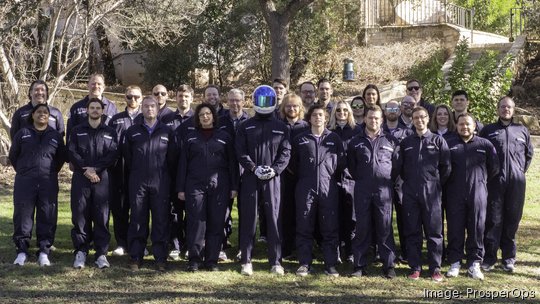
Most startups raise a bunch of venture capital funding to help put them on a path to profitability. Austin-based ProsperOps pretty much did the inverse.
The startup, which uses automation to help tech businesses save on cloud computing spending, started to turn a profit in 2020. That was roughly two years after its founding. While it raised a few hundred thousand from friends and family to get things going, it avoided the traditional venture capital circuit for three years.
"We didn't really want to follow the VC path," co-founder and CEO Chris Cochran said.
But, with growing interest in its products, the company saw an opportunity to raise venture funding to accelerate its growth in the emerging industry of financial optimization, or FinOps. ProsperOps said Feb. 23 it has raised a $72 million investment led by H.I.G. Growth Partners.
Cochran and his fellow co-founders, Chief Technology Officer Chris Kuehl and Chief Product Officer Erik Carlin, all previously held high-level roles at San Antonio-based Rackspace. The trio not only realized the potential for optimizing cloud spending at Rackspace, they also developed a tight network there. So when a Rackspace executive introduced them to H.I.G., they listened.
"We just knew that a long-term capital partner would allow us to go and attack on multiple dimensions – maybe beyond what we were able to do as we were just sort of organically growing the business," Cochran said. "And so once we sat down with them things tended to move pretty fast because there was a sort of a meeting of the minds with what they saw about [this being the] first or second inning of cloud cost optimization, where it was going, and a match between our philosophies."

Cochran declined to share the company's valuation.
ProsperOps has largely been focused on Amazon Web Services, the largest provider of cloud computing.
Many companies, especially web development and pure tech businesses, struggle to right-size their cloud computing needs and costs because cloud usage can vary dramatically day-to-day. ProsperOps' platform monitors a wide variety of cloud usage and spending data. It then automates most of the analysis and decision-making that has previously been left to engineers, and it shows how its moves have saved money.
Cochran said ProsperOps is akin to a roboadvisor for cloud computing.
He also noted that as tech companies around the world tighten their belts to prepare for economic headwinds, ProsperOps is getting more attention because it can save such businesses time and money at a time when cloud spending is continuing to grow.
AWS is constantly adjusting its menu of offerings, discounts and capabilities. That's also a plus for ProsperOps.
"Each time they evolve their products that creates an opportunity to bring a new sort of tool into our management capability," Cochran said. "And we're always finding different ways to go and solve this problem for customers in better and more efficient ways."
ProsperOps, a remote-first company, has grown from a small team over its first few years to 29 employees. Just under half of them are based in Austin. Cochran said ProsperOps plans to roughly double headcount to about 60 employees by the end of the year.
While it doesn't have an office, Cochran said the startup will likely open one in Austin in the near future. The company is in the early stages of that search, but Cochran said he likes the vibe of South First Street.
With the new funding and growing team, ProsperOps is expanding its reach to service other cloud computing providers, and it is also exploring an expansion from financial optimization to engineering optimization.
The FinOps Foundation, which tracks financial optimization efforts through surveys and data, said in its 2023 State of FinOps report that empowering engineers to take action on cloud usage is the biggest problem tech companies face.
"You can see a lot of the pain points are persisting, and everyone's acknowledgement that this is the time where they need more from automation," Cochran said. "And for us, it is like 'how do we amplify what we're doing?' Get to more clouds, get to more customers, do more things, and that's sort of how we think about 2023."







